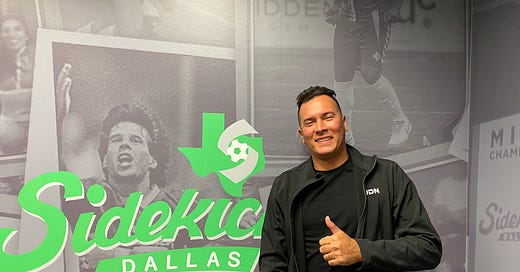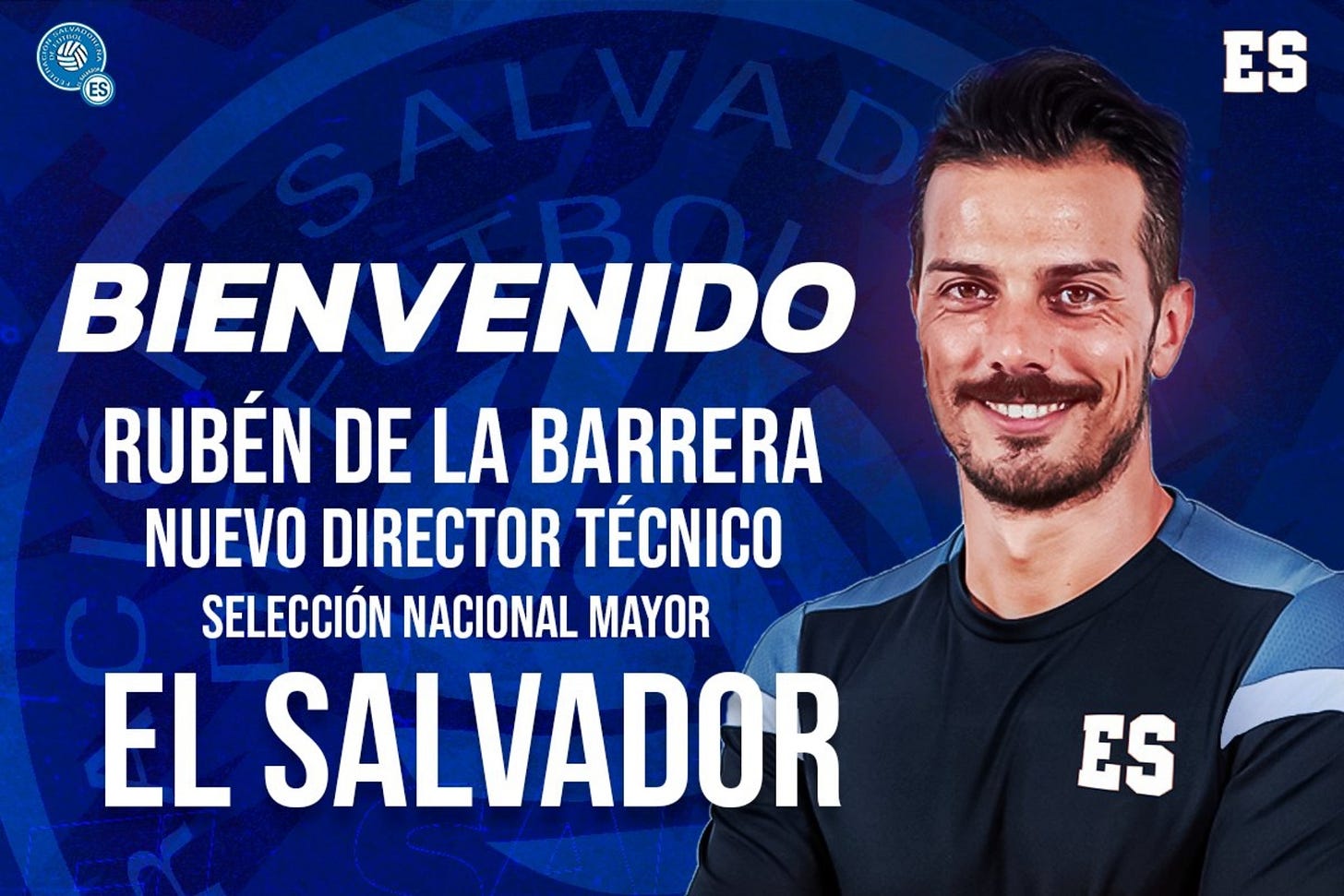🇵🇦🇺🇸 Why is 42-year-old Blas Perez playing indoor with the Dallas Sidekicks ... again?
It's a story of friendship and a man who really, really loves the game. PLUS: Thoughts on El Salvador's manager bailing after three months.
Reporting from Allen, Texas
Blas Pérez is a nice guy. Everyone around him will tell you. Prod him a bit and even he’ll admit it.
It can still be hard to believe that Blas Pérez is a nice guy because Blas Pérez did not look like a nice guy during 20 years on the soccer field.
“I gave everything for my teammates on the field,” Perez said. “They knew I was a bit of a fighter, here in MLS too I was known for that, but my teammates were happy with me because I fought for them.”
But Pérez is so nice, in fact, that he ended up here, welcoming me into an office in a north Dallas suburb to explain why, at age 42, he signed up for a second season with the Dallas Sidekicks of the Major Arena Soccer League.
It started with a message from a friend. Daniel Granados was the kit man for FC Dallas when Pérez started his MLS career in North Texas. Granados left the club before Pérez did, but his journey brought him back to North Texas, working as assistant general manager for the Sidekicks.
He reached out to his old friend, asking him to join the team. Pérez had been retired since shortly after the 2018 World Cup, when he and a legendary generation of Panama players made the Central American nation’s debut at the tournament. Yet, Granados said he wasn’t surprised when Pérez accepted his offer and flew north for the winter.
“I think he likes challenges,” Granados said. “Last year when I called him, he was thinking, ‘Can I do it?’”
The answer was yes … and no.
The Sidekicks endured a miserable campaign, winning just one match. Pérez scored when he played - 11 goals in nine matches - but couldn’t get on the field often enough because of his fitness.
In spite of that frustration, or perhaps because of it, Pérez is back. This year he arrived well before the season opener to go through the preseason training and make sure he’s more fit than he was last year.
“It had been years since I did a preseason, and it was tough at first, but your body doesn’t forget,” he said. “My family likes that I’m playing.
“In Panama, people ask, ‘Hey Blas are you still playing up there? You could come back to the national team!’ Obviously we’re not getting there but I have this commitment to the club because they’ve given me their confidence. I really respect that.”
Other MLS veterans sometimes pop up in the MASL. Ex-Guatemala international Moises Hernandez also is playing with the Sidekicks this season. Jermaine Jones and Landon Donovan are among players who made cameos in recent years. This season, former Mexico international Marco Fabian signed a two-year deal with Ontario, California-based Empire Strykers that includes an ownership option when that contract runs out.
Pérez insists he is back for year two simply because he wants to be.
“Honestly, I struggled because last year I came in bad physically,” Pérez said. “That only motivated me to continue this year even more, keep helping Danny, be in the city because I was here for four years with FC Dallas and a lot of fans know me or come to the arena to see me play, Panamanians. That keeps you interested in going forward.”
Winters with the Sidekicks aren’t Pérez’s only activity. He’s an active soccer dad, with his 18-year-old son Blas Jr. captaining Plaza Amador’s second team and occasionally getting first-team minutes. He runs an academy in Panama, working to refine young players. He has a seafood joint. He’s often featured on TUDN analyzing Panama matches.
Pérez and much of the generation that took Panama to the 2018 World Cup are trying to do their part to help Panama reach new heights on the soccer field. They want to be the pioneers but not the last generation of Panamanian greats.
Felipe Baloy is coaching Tauro. Gabriel Gomez is the sporting director for Sporting San Miguelito. Even active players like Gabriel Torres or recently active Luis Ovalle are working at the youth level to build the next generation.
“Almost all of us are in that soccer environment. That’s the idea, that those of us who were historic, if you call it that, can bring something to Panamanian football,” Pérez said. “I’ve always said I’m available and ready for the opportunity.”
That includes a plan the forward has to get young futsal players deals with the Sidekicks or other MASL teams, he said, opening the market for Panama like he did when he played in Colombia and later Liga MX and MLS.
For Pérez, the best path for Panamanians who want to reach the same level he did is still to leave the country’s domestic league as quickly as possible.
“In Panama, I’ve seen little growth. That’s the reality,” he said. “The reality is that we don’t have infrastructure, and everyone knows it. We have a league that we hope in the future can grow and be able to take care of the players. You look at the fields, almost all the fields in Panama are artificial turf, which really affects the player.”
For Pérez, the media coverage and marketing is there during moments like the near-miss in 2014 qualification or the successful 2018 campaign and even times like this summer when Panama made the Gold Cup final, but “when the first game of the league starts the stadiums are empty. The fans don’t identify with the clubs.”
That lack of a culture around the team is the same challenge the Sidekicks are trying to overcome. The original Sidekicks drew big crowds to Reunion Arena, and many fans still have nostalgia for the brand. Granados said the team’s market research shows most fans who express fond memories of going to games in downtown Dallas aren’t even aware the Sidekicks were rebooted and now play in Allen.
Having Pérez helps get the hardcore soccer fans into the building, with a large crowd turning up for opening night and seeing Pérez net a hat trick.
He was back on the field for a loss Saturday, not the result he’s hoping for but a good sign he’ll be able to play week-in, week-out in a league that often sees teams play two matches in a weekend.
Pérez wants to be on the field as much as possible, continuing to do what he loves: Scoring goals and helping others. Right now, it’s an old friend from his FCD days, soon it may be a program in Panama or somewhere else where a nice guy can lend a hand.
🇸🇻 Rubén de la Barrera Fernández’s name longer than his tenure with El Salvador
After El Salvador kicked Hugo Perez to the curb, it announced that Spain native Ruben de la Barrera would take over as men’s national team manager.
He left yesterday, a day before he would’ve been in the role for three months, reportedly to take a job managing F.C. Vizela in the top division of Portugal.
“Soccer picks its own timing,” he said at a hastily scheduled news conference conducted on Zoom. “Sometimes opportunities come up when you don’t have a team, or sometimes when you’re working. You can’t control it.”
This is the risk you take when you hire someone who has no real tie to not just your country but the region as a whole, that he will jump at the first possible opportunity to go back to the old continent, that any sort of progress made in the last few months will be undone, a new search undertaken.
There probably is plenty not to like about the El Salvador job. When Perez was in it, he spoke often about the need for more support from the clubs, the need to bolster the development programs in El Salvador and how the federation - which currently is being run by a normalization committee - needed to change to help the coaches of all national teams perform better.
And, look, no disrespect, but this is the field one of the finalists is training on today. Clearly, it’s going to be difficult to catch Mexico or the U.S. without real investment in infrastructure.
As a Salvadoran and a trusted, veteran voice, Perez can speak out easily, but De La Barrera is much more likely to exit stage left than fight against the system.
Yet, the fact that El Salvador’s directors didn’t see this coming is concerning. It may seem to be a bit of a paradox, but when hiring an international manager, you need to find someone ambitious about their work but not so ambitious that they will break their commitment as quickly as possible.
Diogo Goma, the Director of National Teams, said the departure had nothing to do with El Salvador’s project and claimed it’s a positive that a club had paid the clause to free up the manager and sign him.
“Tell me one player who has gone from El Salvador to a top division in an important league or a player who has been bought by a first-division league,” Goma said. “The fact a club comes here and pays for a manager means we’re doing well.”
Really? Was it the two draws in friendly matches against Curacao that enticed Vizela into bringing in De La Barrera or the draw and a loss in Concacaf Nations League contests?
Clearly, the Portuguese team is betting on getting the most out of the manager after what he did in La Liga, the same things El Salvador hoped to have.
Clearly, De La Barrera wasn’t the right person to lead El Salvador long term.
Now, El Salvador will need to work out who that person is after determining it wasn’t Perez and being spurned by De La Barrera. If they hire quickly, they can entice a manager with the fact that their first game would come against Lionel Messi and Inter Miami.
Clearly, they need someone who understands the job will be much, much less glamorous after that.










Can we expect a MASL-Monday going forward now? Lots of Indoor and Futsal in the region after all. 🤣. Fun read, I like to catch the MASL when I can on Twitch.
Loved the story on Blas. I think for Hugo the task was too great. I know he backfilled that roster with LA kids and he did what he could with a massive lack of resources, but was always lamenting the lack of support he received.